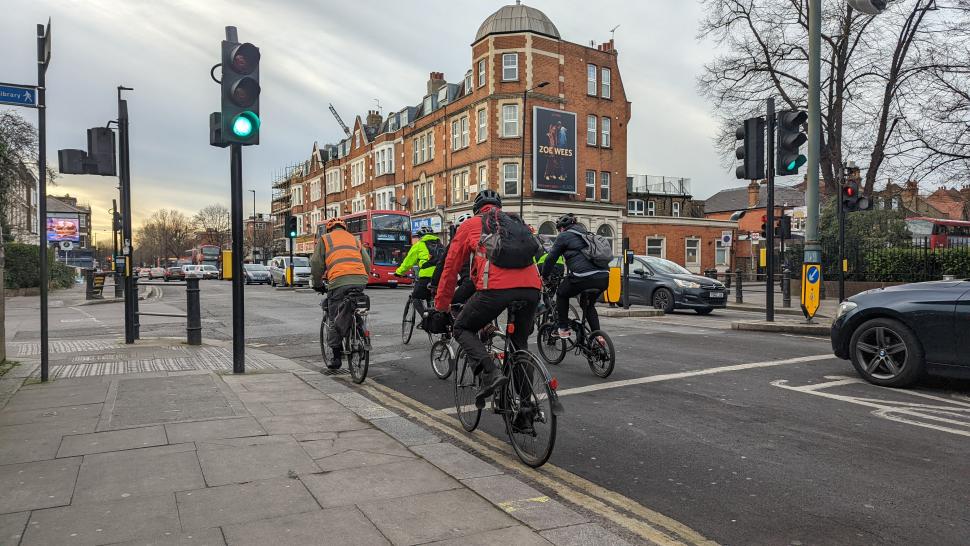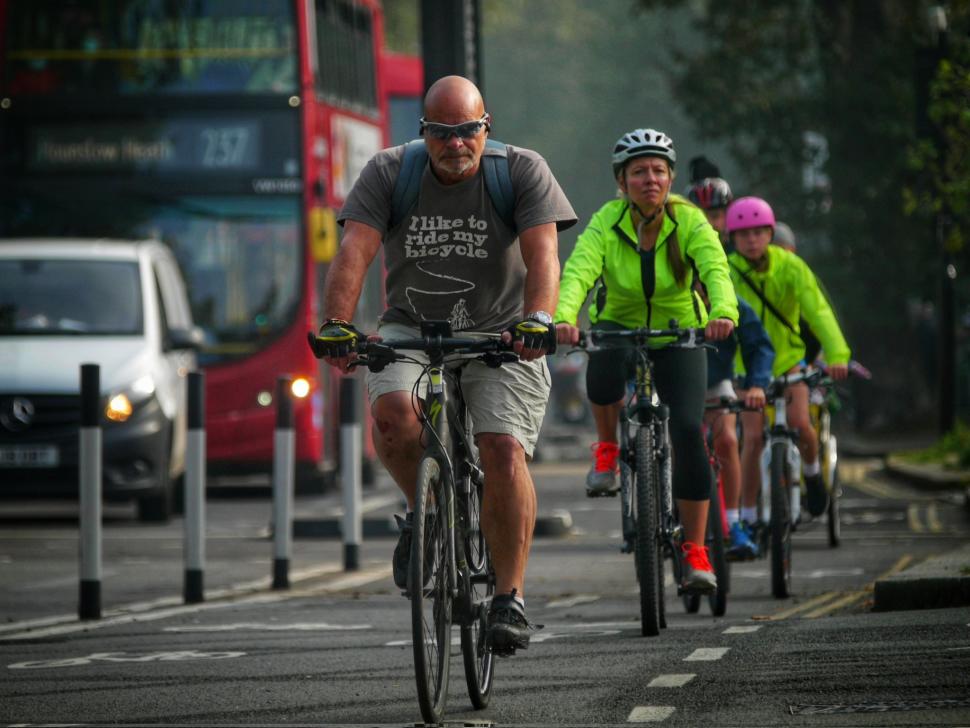- News
- Reviews
- Bikes
- Components
- Bar tape & grips
- Bottom brackets
- Brake & gear cables
- Brake & STI levers
- Brake pads & spares
- Brakes
- Cassettes & freewheels
- Chains
- Chainsets & chainrings
- Derailleurs - front
- Derailleurs - rear
- Forks
- Gear levers & shifters
- Groupsets
- Handlebars & extensions
- Headsets
- Hubs
- Inner tubes
- Pedals
- Quick releases & skewers
- Saddles
- Seatposts
- Stems
- Wheels
- Tyres
- Tubeless valves
- Accessories
- Accessories - misc
- Computer mounts
- Bags
- Bar ends
- Bike bags & cases
- Bottle cages
- Bottles
- Cameras
- Car racks
- Child seats
- Computers
- Glasses
- GPS units
- Helmets
- Lights - front
- Lights - rear
- Lights - sets
- Locks
- Mirrors
- Mudguards
- Racks
- Pumps & CO2 inflators
- Puncture kits
- Reflectives
- Smart watches
- Stands and racks
- Trailers
- Clothing
- Health, fitness and nutrition
- Tools and workshop
- Miscellaneous
- Buyers Guides
- Features
- Forum
- Recommends
- Podcast
 Cyclists at traffic lights, London © Simon MacMichael
Cyclists at traffic lights, London © Simon MacMichaelNew research finds commuting by bike can improve mental health, with those who cycle to work less likely to be prescribed antidepressants
A new study from researchers at the University of Edinburgh has highlighted the beneficial impact on mental health that cycling to work can have, with those who commute by bike less likely to be prescribed antidepressants.
The research published today in the International Journal of Epidemiology is the work of Chris Dibben, Laurie Berrie, Zhiqiang Feng, David Rice, Tom Clemens and Lee Williamson, and is titled: 'Does cycle commuting reduce the risk of mental ill-health? An instrumental variable analysis using distance to nearest cycle path'.
Linking commuting data from Glasgow and Edinburgh, accessed via the Scottish population census, with mental health prescriptions from the National Health Service Prescribing Information System records, researchers were able to note cycle commuters had a lower level of mental health prescriptions than among other commuter types.
In total, 378,253 people aged 16 to 74 and living and working in the City of Edinburgh and Glasgow City council areas at the time of the 2011 census, and who lived within one mile of a cycle path, were included in the study. Among cyclists, nine per cent were found to have a prescription for mental health, compared with 14 per cent in the non-cyclist category.
A mean average 15 per cent reduction in prescriptions for antidepressants in the five years following the census was estimated for those who travel to work by bike compared with those using any other mode of commuting.
"This work suggests that cycle commuting is causally related to reduced mental ill-health and provides further evidence in support of the promotion of active travel to encourage commuters travelling shorter distances to shift to cycle commutes," the research concluded.
> Best commuter bikes 2024 — beat the traffic by cycling to work
At the time of the census just 1.85 per cent of commuters in Glasgow and 4.8 per cent of commuters in Edinburgh cycled to work. Speaking to STV, the professor who led the study, Chris Dibben, commented: "Our finding that this economical and sustainable method of travelling to work also enhances mental health suggests that a policy of investing in cycle paths and encouraging active commuting is likely to have wide-ranging benefits.
"Not only could this improve people's mental health, it could also help reduce carbon emissions, road congestion and air pollution."
Dr Laurie Berrie added: "Our study used the fact that otherwise similar people are more likely to cycle to work if they live close to a cycle path. Using this property, it was possible to mimic a randomised controlled trial and compare the mental health of those who cycled to work to those using other modes of transport but who were otherwise comparable."
Dan is the road.cc news editor and joined in 2020 having previously written about nearly every other sport under the sun for the Express, and the weird and wonderful world of non-league football for The Non-League Paper. Dan has been at road.cc for four years and mainly writes news and tech articles as well as the occasional feature. He has hopefully kept you entertained on the live blog too.
Never fast enough to take things on the bike too seriously, when he's not working you'll find him exploring the south of England by two wheels at a leisurely weekend pace, or enjoying his favourite Scottish roads when visiting family. Sometimes he'll even load up the bags and ride up the whole way, he's a bit strange like that.
Latest Comments
- chrisonabike 3 sec ago
Sounds counterintuitive but I think fixing the legal system would be harder that fixing the street design and rules - and might even cost more! ...
- brooksby 1 hour 41 min ago
It raises the question of why (or whether) the driver was even trying to park there; but for me, the scariest comment is by the taxi driver who...
- aramaerospace 3 hours 26 min ago
Increased drive friction and power loss:...
- Geoff H 5 hours 33 min ago
I was really enjoying the article until I came to the price!
- OldRidgeback 6 hours 26 min ago
I have a very old MTB (guess what make) that I'll happily leave locked at the train station or shops or whatever. The fairly new Trek MTB or...
- TheBillder 8 hours 1 min ago
Dualling that stretch of the A7 will allow hard-pressed motorists to travel very slightly faster between the rock that is the Sherriffhall...
- jaymack 10 hours 58 min ago
We must be related!
- The_Ewan 12 hours 28 min ago
But why worry if a few people do? It's just not a big deal....
- Tom_77 13 hours 32 min ago
Tempted to get him a sweary birthday cake like in The Thick Of It....
- Bigtwin 14 hours 36 sec ago
Didn't happen did it? They came into my shop a couple of years back and said it was "on the way", but never heard anything more.



Add new comment
7 comments
Hi, please note that in no way an observational study can determine a causal link between two variables. This is really wrong and unscientific. I do like cycling, I feel its benefits to my mental health, but, again, to prove causation it takes different kind of studies (interventional, RCT etc). Using a proxy variable (distance from cycling path) does not change this fact.
Could it be the other way round - that people with poor mental health are less likely to want to get on a bike in the first place?
I haven't read the study, but the authors' conclusion is that there is a causal link rather than simply a correlation. If they're right, then it's not the other way round.
The article also notes a reduction in prescriptions over time for the group who both cycled and had a mental health issue, which also points to the likely direction of causality.
There is definitely an observed link between devolution towards neanderthal state and drivers of SUVs. BMW drivers have regressed further towards original amoeba. Range Rover owners can't be easily observed because their vehicles are mostly stolen.
There is definitely an observed link between regression towards neandertal state and drivers of SUVs
I don't know about this- SUV drivers are of the same mentality as pickup drivers and the latter have caught on rapidly to the new self-declaration scheme for MOT, insurance and VED. Even in Lancashire, many other drivers do not have the sense to avail themselves of this bureaucracy-busting dodge
The study acknowledges limitations, but it has at least tried to account for other factors using standard methodologies with the limited data available. It may allow for funding of more rigorous studies in the futures.
There have been lots of other studies that show that spending time in green spaces, or access to green spaces is good for our mental health. I saw a presentation where measurements of stress chemicals and blood pressure (I think) were taken as people did different things and accessed different spaces.
It may be no single study is conclusive, but I'd like to think there is enough evidence to challenge the status quo when it comes to the pitiful share of transport spending on active travel.
'Not only could this (cycling) improve people's mental health, it could also help reduce carbon emissions, road congestion and air pollution."
on Sunday I was cycling through Camden (N London) when this car started hooting, then raced past me, brake checked me, then raced another 20m and slammed the brakes on cos the lights were red. I drew up alongside and looked at the bloke, he wound his window down, I asked him why he hooted at me and then he started a demented scream out about cycling in the middle of the road, I'm gonna run you over etc. He definitely was mental. I told him to calm down and then cycled off whilst he remained in the traffic. I could still hear him screaming in the distance.